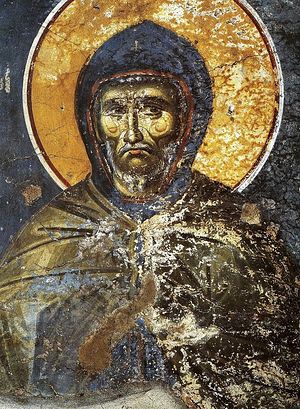OrthoChristian.com is posting this explanation of the Prayer of St. Ephraim the Syrian, repeated many times at every Lenten service, as a series. Today the holy hierarch Luke (Voino-Yasnetsky) discusses the spirit of despondency.
An Explanation of the Prayer of St. Ephraim the Syrian. Part 1
“O Lord and Master of my life! The spirit of despondency give me not!” What is the spirit of despondency? It is what they call falling in spirit. People who have no understanding of Christianity look at monks wearing black clothing and with lowered heads, fingering their prayer ropes, and think that all religion is depressing. But that’s not how it is at all. That would contradict the spirit with which all of Christianity is permeated; for, tell me, can a depressed person possess the spiritual strength and energy needed to walk the narrow path, indefatigably warring with the sinfulness of life and ascending from strength to strength?
Of course not! Our religion is not the religion of depression, but cheerfulness, energy, strength of will and character, which has as its fruit not depression but something absolutely opposite—what the holy apostle Paul spoke of: But the fruit of the Spirit is love, joy, peace, longsuffering, gentleness, goodness, faith, meekness, temperance: against such there is no law (Gal. 5:22–23). This is the true spirit and essence of our religion—not depression, but righteousness and peaceful joy in the Holy Spirit. Could anyone who possesses this joy be depressed? Of course not!
People are often mistaken when they evaluate a person’s appearance. The true Christian does not have an appearance that would betray his joy of life. He is always peaceful, often apparently deeply immersed in thought, betraying his contemplation. His thoughts are concentrated on the eternal, on the Kingdom of God, turned to the Lord Jesus Christ—and therefore he is always serious.
It can happen that a Christian [ascetic] becomes despondent from time to time. This happens to those who, having travelled far on the path to Christ, the path of renouncing the temptations of the world, sometimes return to their former path; it seems to them that they were wrong to leave that path, the path that most people follow. Then they fall into despondency.
The devil tempts them, legions of demons stop their movement and hinder them along their path of Christ, presenting them pictures of family happiness and blessed friendships, and pull them back from this great path to that former path. And not rarely do the demons succeed in their aim—the ascetic falls in spirit and loses his zeal for the Lord Jesus Christ. Despondency is a great danger that waylays a Christian on his path to Christ. It is a diabolical temptation.
All the saints were subjected to these attacks from the spirits of darkness, and in the vast majority of cases, by prayer, fasting, and vigils Christians have conquered the spirit of despondency brought on by the devil.
But there were also those in whose souls the spirit of despondency simply grew, and they departed from the path of Christ. And when they left it, they felt abandoned by God, the emptiness and heaviness of life became unbearable to them and they often ended their own lives with suicide. This is why all the saints considered despondency to be a great danger and misfortune, and directed all their forces to battle against the spirit of despondency.
Sometimes, when a person has attained to a lofty life, he can get a high opinion of himself—and then God’s grace leaves him for a time. Then he falls into a heavy, unbearable state of spirit—his heart immediately becomes empty. Instead of warmth and joy there is deep despondency. The Lord does this in order to remind the ascetic that he walks the path of Christ not through his own strength but by the grace of God. This is one source of despondency.
What other sources of despondency are there? Idleness is one of the mothers of despondency. Idle people who do not work and yet are materially well off, who are satiated with the good things of this life and drowning in luxury, lose the taste for life. They become jaded, everything becomes uninteresting and boring, nothing brings them joy, and their hearts become filled with despondency—the terrible and dangerous enemy of our salvation.
Yet another source of despondency is pessimism. Pessimists tend to see everything in a murky light, to concentrate on the dark and sinful. If a person notices only the dark and the bad in life the despondency that has taken over the mind grows to the point where the person doesn’t see anything good, and ends his life in suicide. That is how strong the spirit of despondency is.
The most often-encountered source of despondency is bitterness and sorrowful events that people experience in life. A close one dies, a husband or son, and the mother falls into serious depression. This mother sees nothing good in the world. She thinks only about the deceased one, wanders in thought around his grave, imagines him lying in the coffin, and her depression spirals ever deeper.
How can one be freed of this? One mustn’t remember the past and keep shedding tears. The deceased is very, very far away. His soul is standing before God and the angels, rejoicing over his freedom. One has to exert every effort to be carried in thought to that place where the dearly beloved now is. If we concentrate not on the dark and corruptible but on the eternal, the spirit of despondency will go away.
Sometimes serious illnesses can throw one into despondency. There are many people who do not patiently endure illnesses. But there were saints who were sick and bedridden all their lives, and yet they praised God for it. We have to remember such people and know how to accept the illnesses sent by God. We should not refuse the help of a doctor, for the wise son of Sirach says, Honour a physician with the honour due unto him for the uses which ye may have of him: for the Lord hath created him (Eccl. 38:1 KJV). A doctor is God’s servant, who can relieve suffering and thereby drive away the spirit of despondency.
Such are the sources and causes of despondency. The main means for struggling with them, tested many years by all the saints, is prayer. There is nothing more effective than prayer, the constant asking for help from God.
When you begin to converse with God, He consoles you, and routes the spirit of despondency. And if you open your heart before a pastor of the Church at confession and then receive the Body and Blood of Christ, you will feel relief and joy, and the spirit of despondency will be driven away from you in disgrace.
Do not concentrate on the dark, sinful, and heavy; ascending on high in spirit, in your heart abide with God, in the heavenly chambers, where the dark spirits have no access.
And what is there to be said about people who practically do not know Christ, who seek the worldly path, who seek joy and consolation from the world? Outwardly they often seem satisfied, cheerful, and happy, as if they have no despondency. Do not think that that is true. In the depths of their souls their consciences do not cease to reprove them, and no one can completely lull his conscience. This is the constant suffering of those who chase after worldly prosperity. The apostle Paul says, For godly sorrow worketh repentance to salvation not to be repented of: but the sorrow of the world worketh death (2 Cor. 7:10).
If you don’t turn from sorrow for the world to sorrow for God, you will perish! Remember the seriousness of despondency. Remember that the heart of a Christian should be filled with the joy of reaching for the light; it should be foreign to the sadness that fills the hearts of sinners.
May the Lord God have mercy on you, and may St. Ephraim assist you in your prayers!
To be continued.





